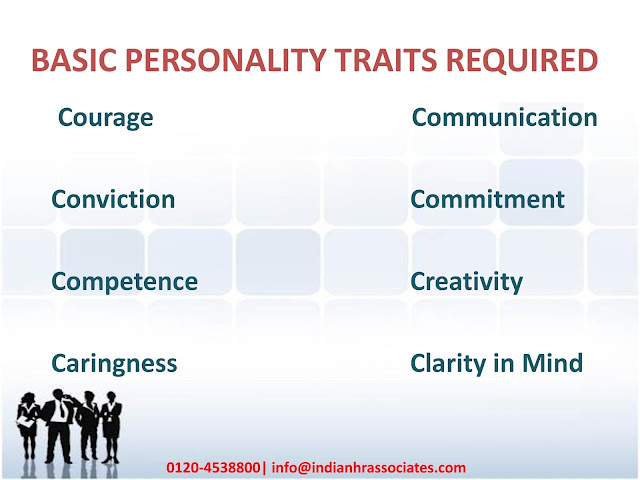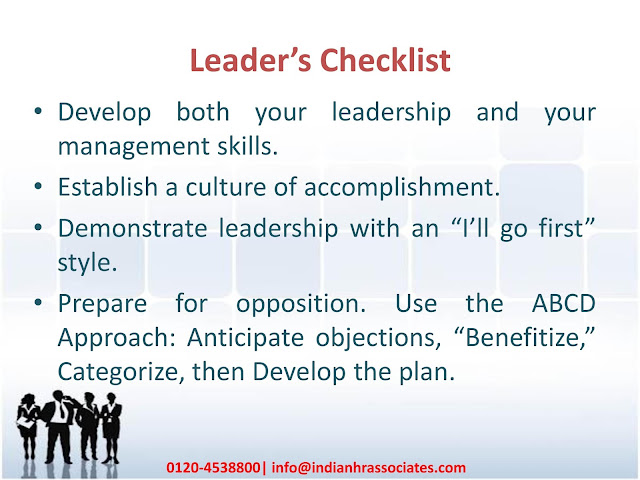
A
Primary task of leadership is to direct attention. To do so, leaders must learn
to focus their own attention. When we speak about being focused, we commonly
mean thinking about one thing while filtering out distractions. But a wealth of
recent research in neuroscience shows that we focus in many ways, for different
purposes, drawing on different neural pathways—some of which work in concert,
while others tend to stand in opposition.
Grouping these modes of
attention into three broad buckets sheds new light on the practice of many
essential leadership skills.
Focusing inward and focusing constructively on others helps
leaders cultivate the primary
elements of emotional intelligence. A fuller understanding of how they focus on
the wider world can improve their ability to: Devise Strategy, Innovate, and Manage
Organizations.
Every leader needs to
cultivate this triad of awareness, in abundance and in the proper balance, because
Focusing on Yourself
Emotional intelligence
begins with self-awareness—getting in touch with your inner voice. Leaders who
heed their inner voices can draw on more resources to make better decisions and
connect with their authentic selves. But what does that entail? A look at how
people focus inward can make this abstract concept more concrete.
Self-Awareness
Hearing your inner voice is a matter of paying careful attention to internal physiological signals. How well people can sense their heartbeats has, in fact, become a standard way to measure their self-awareness.Zeroing in on sensory impression of ourselves in the moment is one major element of self-awareness . But another is critical to leadership:combining our experience across time a coherent view of our authentic selves.
To be authentic is to be
the same person to others as you are to yourself. In part that entails paying
attention to what others think of you, particularly people whose opinions you
esteem and who will be candid in their feedback. A variety of focus that is
useful here is open awareness, in
which we broadly notice what’s going on around us without getting caught up in
or swept away by any particular thing. In this mode we don’t judge, censor, or
tune out; we simply perceive.
Leaders who are more
accustomed to giving input than to receiving it may find this tricky. Someone
who has trouble sustaining open awareness typically gets snagged by irritating
details, such as fellow travelers in the airport security line who take forever
getting their carry-on’s into the scanner. Someone who can keep her attention
in open mode will notice the travelers but not worry about them, and will take
in more of her surroundings.
Self-knowledge
Of course, being open to
input doesn’t guarantee that someone will provide it. Sadly, life affords us
few chances to learn how others really see us, and even fewer for executives as
they rise through the ranks. That may be why one of the most popular and
overenrolled courses at Harvard Business School is Bill George’s Authentic
Leadership Development, in which George has created what he calls True North
groups to heighten this aspect of self-awareness.
Groups are based on the
precept that self-knowledge begins with self-revelation. Accordingly, they are
open and intimate, “a safe place,” George explains, “where members can discuss personal issues they do not feel
they can raise elsewhere—often not even with their closest family members. What
good does that do? We don’t know who we are until we hear ourselves speaking
the story of our lives to those we trust,” George says. It’s a structured way to match our view of our true
selves with the views our most trusted colleagues have—an external check on our
authenticity.
Self-control
“Cognitive control” is
the scientific term for putting one’s attention where one wants it and keeping
it there in the face of temptation to wander. A colloquial term for it is
“willpower.”
Cognitive control enables
executives to pursue a
goal despite distractions and setbacks. The same neural
circuitry that allows such a single-minded pursuit of goals also manages unruly
emotions. Good cognitive control can be seen in people who
Executives who can
effectively focus on others emerge as natural leaders regardless of
organizational or social rank.
Tests of willpower by the
psychologist Walter Mischel’s experiment on children statistical analysis
showed that a child’s level of self-control was a more powerful predictor of
financial success than IQ, social class, or family circumstance.
How we focus holds the
key to exercising willpower, Mischel says. Three sub varieties of cognitive
control are at play when you pit self-restraint against self-gratification:
Focusing on Others
The word “attention”
comes from the Latin attendere, meaning
“to reach toward.” This is a perfect definition of focus on others, which is
the foundation of empathy and of an ability to build social relationships—the
second and third pillars of emotional intelligence.
We talk about empathy
most commonly as a single attribute. But a close look at where leaders are
focusing when they exhibit it reveals three distinct kinds, each important for
leadership effectiveness:
- Cognitive empathy—the ability to understand
another person’s perspective;
- Emotional empathy—the ability to
feel what someone else feels;
- Empathic concern—the ability to
sense what another person needs from you.
Cognitive
empathy enables leaders to explain themselves in meaningful ways—a
skill essential to getting the best performance from their direct reports.
Contrary to what you might expect, exercising cognitive empathy requires
leaders to think about feelings rather than to feel them directly.
An inquisitive nature
feeds cognitive empathy. As one successful executive with this trait puts it,
“I’ve always just wanted to learn everything, to understand anybody that I was
around—why they thought what they did, why they did what they did, what worked
for them, and what didn’t work.” But cognitive empathy is also an outgrowth of
self-awareness.
The executive circuits
that allow us to think about our own thoughts and to monitor the feelings that
flow from them let us apply the same reasoning to other people’s minds when we
choose to direct our attention that way.
Emotional
empathy is important for effective mentoring, managing clients,
and reading group dynamics, It is about to feel fast without thinking deeply.
They tune us in by arousing in our bodies the emotional states
of others: I literally feel your pain. Our brains patterns match up with yours
when I listen to you tell a gripping story. A study says that you need to
understand your own feelings to understand the feelings of others.
Accessing your capacity for emotional empathy depends on
combining two kinds of attention: a deliberate focus on your own echoes of
someone else’s feelings and an open awareness of that person’s face, voice, and
other external signs of emotion.
Empathic concern, which is closely
related to emotional empathy, enables you to sense not just
how people feel but what they need from you. It’s what you want in
your doctor, your spouse and your boss.
Empathic concern has its roots in the circuitry that compels
parents’ attention to their children. Watch where people’s eyes go when someone
brings an adorable baby into a room and you’ll see this mammalian brain center
leaping into action.
Research
suggests that as people rise through the ranks, their ability to maintain
personal connections suffers.
Empathic concern is a double-edged feeling. We intuitively
experience the distress of another as our own. But in deciding whether we will
meet that person’s needs, we deliberately weigh how much we value his or her
well-being.
Focusing on The Wider World
Leaders with a strong
outward focus are not only good listeners but also good questioners. They are
visionaries who can sense the far-flung consequences of local decisions and
imagine how the choices they make today will play out in the future. They are open
to the surprising ways in which seemingly unrelated data can inform their
central interests.
The wellsprings of innovation
In an era when almost
everyone has access to the same information, new value arises from putting
ideas together in novel ways and asking smart questions that open up untapped
potential. Moments before we have a creative insight, the brain shows some kind
of deflection .It is suggest that what’s happening is the formation of a new
neural network—presumably creating a fresh association.
A classic model of
creativity suggests how the various modes of attention play key roles.
Conclusion
A focused leader is not
the person concentrating on the three most important priorities of the year, or
the most brilliant systems thinker, or the one most in tune with the corporate
culture.
Focused leaders can command the full range of
their own attention: They are in touch with their inner feelings, they can
control their impulses, they are aware of how others see them, they understand
what others need from them, they can weed out distractions and also allow their
minds to roam widely, free of preconceptions.
It takes is not talent so
much as diligence—a willingness to exercise the attention circuits of the brain
just as we exercise our analytic skills and other systems of the body.
The link between
attention and excellence remains hidden most of the time. Yet attention is the
basis of the most essential of leadership skills—
And never has it been under greater
assault.
Our goal here is to place attention
center stage so that you can direct it where you need it when you need it.
Learn to master your attention, and you will be in command of where you, and
your organization, focus.













































